
Protect Your Shoreline With An Itasca Waters Shoreland Advisor
Learn MoreItasca Waters Videos
Below are a number of mini videos on various topics relating to water quality in Itasca County, including good shoreline practices and maintaining healthy lakes for future generations.
Of special interest is our 2022, 2023 and 2024 Practical Water Wisdom Series, each hosted by specialists in their fields.
Be sure to check out our entire collection on YouTube and subscribe to the Itasca Waters YouTube Channel.
Practical Water Wisdom 2026 Series #1
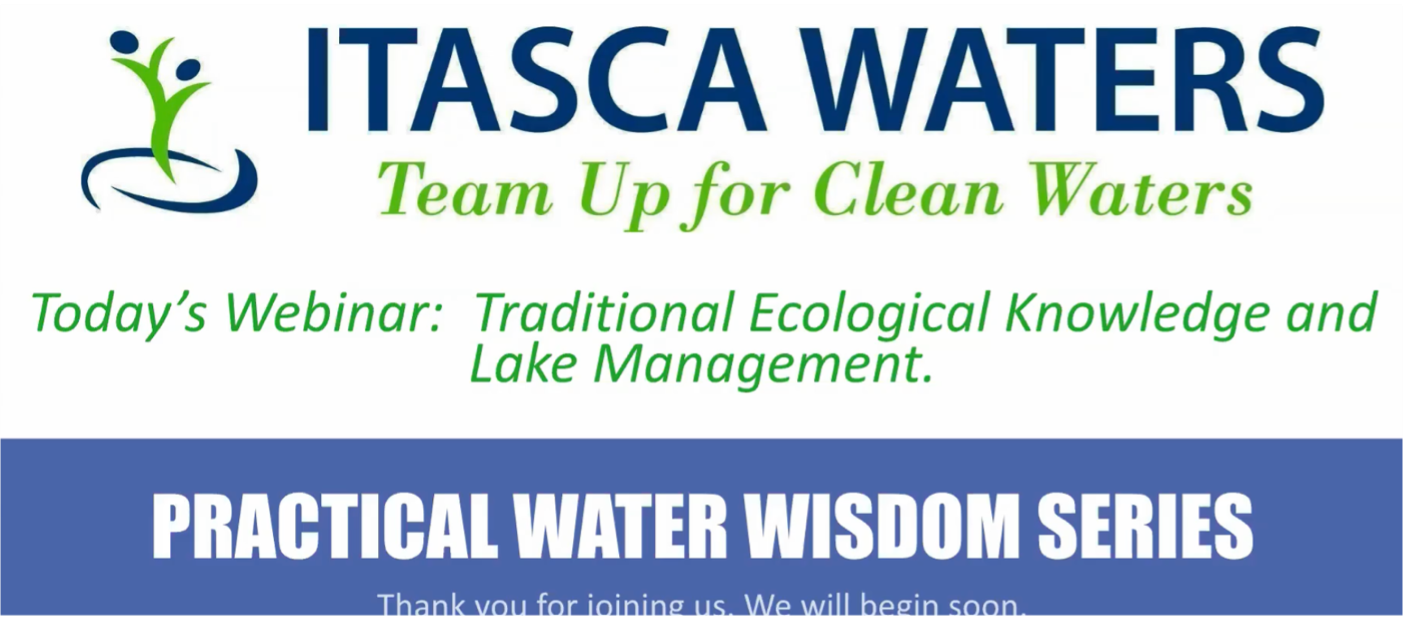
Traditional Ecological Knowledge (TEK) and Lake Management
Over the past two decades, we’ve learned that the most effective way to incorporate tribal community needs and Traditional Ecological Knowledge (TEK) into our lake management work is to support and empower tribal members to manage their own natural resources. Our approach has evolved to focus on increasing tribal representation within resource management roles. Recent initiatives include strengthened outreach to Red Lake Nation College, a tiered mentorship program, and, most recently, the development of an apprenticeship program designed to build long-term capacity within tribal communities.
Read MorePractical Water Wisdom 2025 Series #11
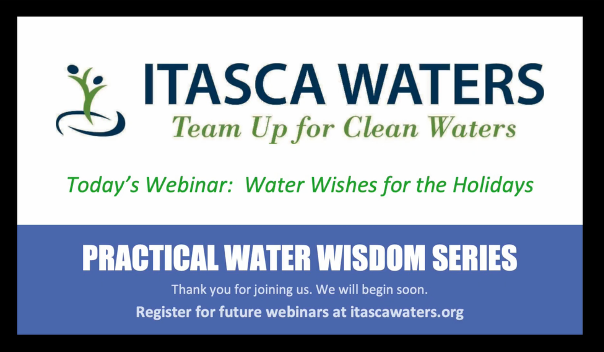
Water Wishes for the Holidays
Looking for meaningful holiday gifts for the young readers in your life? Join us for a special holiday edition of Practical Water Wisdom, where we’ll explore water-themed children’s books that are perfect for sparking curiosity and conversation. Minnesota Sea Grant's John Downing and Hilarie Sorensen will review a selection of fiction and non-fiction titles that connect us to water and nature geared for kids and teens. Holly Ristau, a former educator and storyteller with the Mahnomen School District will offer guidance on how to share these books meaningfully with children. Drawing from her background in teaching storytelling, Holly will share tips for reading effectively to kids, highlighting the importance of telling stories in a way that helps children visualize and connect. She’ll also provide guidance on how families can share their own water stories. We’ll also be joined by Sawyer Lorentz, author of a creative, water-themed coloring book that blends science and art. Whether you're a parent, grandparent, educator, or water enthusiast, this webinar will help you connect the children in your life with water through the power of storytelling.
Read More
Practical Water Wisdom 2025 Series #10
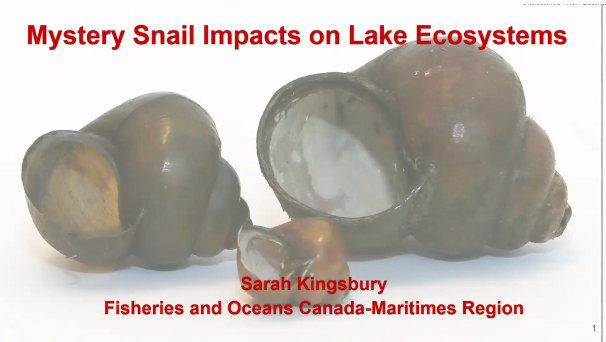
Mystery Snail Impacts on Lake Ecosystems
Presented by Sarah Kingsbury, the senior aquatic invasive species biologist for Fisheries and Oceans Canada working in Nova Scotia, Canada. She specializes in freshwater non-indigenous species but has multiple projects in marine ecosystems too.
Non-indigenous freshwater species can negatively impact invaded ecosystems ecologically, socially, and economically; and sometimes the smallest of organisms can have surprising impacts. This presentation will focus on invasive mystery snail impacts to continental North America and will include information on three invasive mystery snails: Chinese mystery snails, Japanese mystery snails, and banded mystery snails. We will also explore potential mechanisms for continued mystery snail dispersal and what can be done to stop the spread.
Read More
Practical Water Wisdom 2025 Series #9
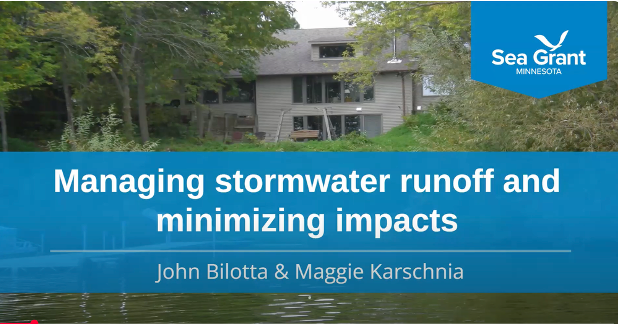
Managing Stormwater Runoff and Minimizing Impacts
Our presenters, John Bilotta and Maggie Karschina, will discuss what individual shoreland property owners can do to prevent, minimize, and mitigate stormwater runoff from their property and discuss research into future trends.
Stormwater runoff refers to rainwater or melting snow that flows over land surfaces without infiltrating the ground. In natural landscapes, much of this water is absorbed by soil and vegetation. However, on shoreland properties with impervious surfaces like rooftops, driveways, landscaped areas and compacted soils, the water cannot penetrate the ground, leading to increased runoff. Unchecked stormwater runoff from shoreland properties can contribute to water pollution, erosion and flooding.
Read More
Practical Water Wisdom 2025 Series #8
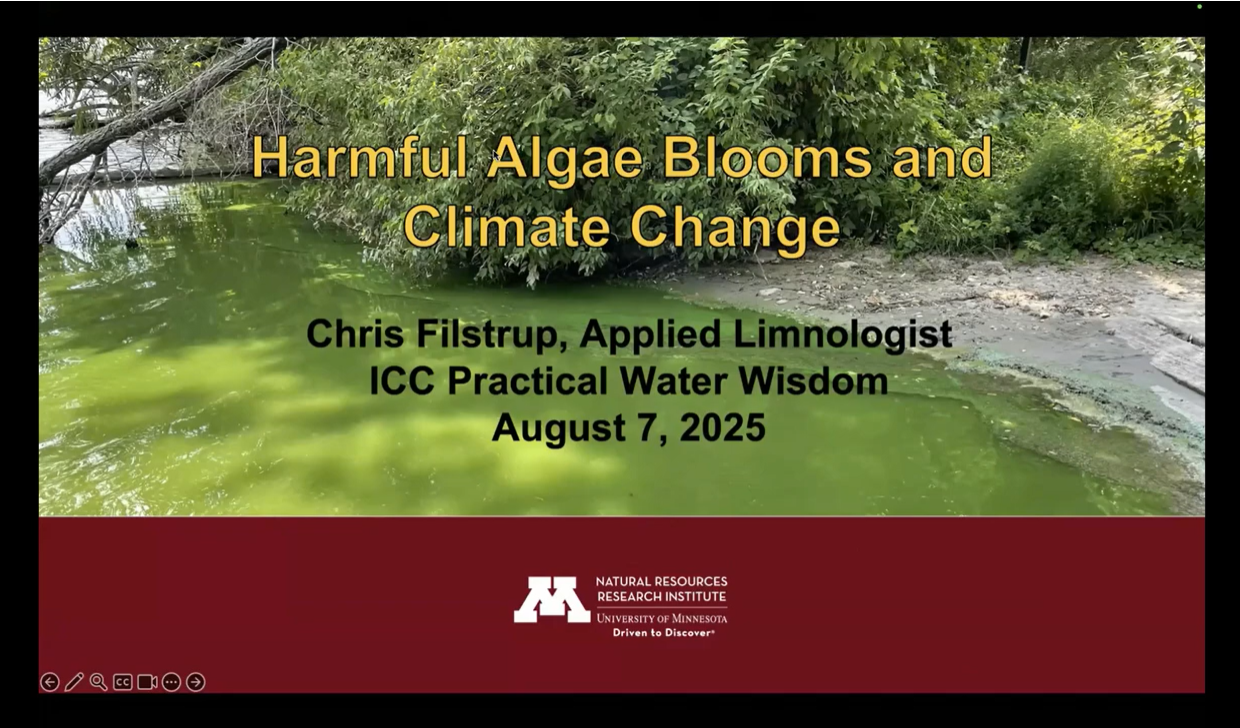
Harmful Algae Blooms and Climate Change
Chris Filstrup is a limnologist at the University of Minnesota Duluth’s Natural Resources Research Institute, an applied research institute that delivers integrated research solutions that value our resources, environment, and economy for a sustainable and resilient future. His research focuses on harmful algal bloom ecology, nutrient cycling in aquatic ecosystems, watershed nutrient reduction strategies, and freshwater resources management. His research interests take him from small farm ponds to the Laurentian Great Lakes and involve analyzing datasets from a single Minnesota lake to thousands of lakes scattered across the continental United States.
Read More
Practical Water Wisdom 2025 Series #7
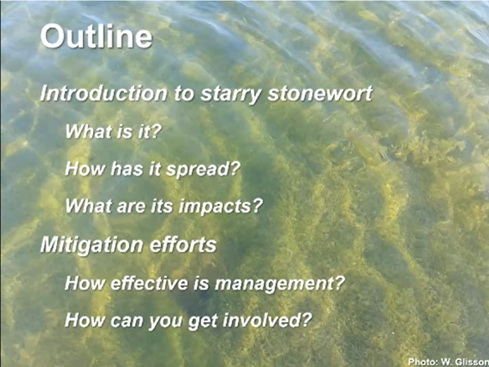
Biology and Management of Starry Stonewort
Daniel Larkin, Ph.D, will talk about the history of starry stonewort in North America and Minnesota, what is known about factors that influence its spread, its impacts to native aquatic plant communities, and control methods and outcomes.
Read More
Practical Water Wisdom 2025 Series #6

Septic Health Check: A Deep Dive into Inspections & Maintenance
Join Minnesota Sea Grant and Itasca Waters for a down-to-earth look at septic system inspections in action! In this next session of Practical Water Wisdom, you’ll follow the folks from Northwoods Excavating into the field (literally!) as they inspect a septic system in Itasca County. Learn what keeps your system working like a champ—and why it matters for people and the planet.
Read More
Practical Water Wisdom 2025 Series #5

Climate Change Effects on Fisheries
This presentation will highlight some of the recent research projects being done by the Minnesota Department of Natural Resources (MNDNR) Fisheries Research Unit, specifically related to potential effects of climate change on the state’s fisheries.
Read More
Practical Water Wisdom 2025 Series #4

Beaver Dams, Ponds and Effects
Beavers are powerful ecosystem engineers capable of radically transforming the landscapes they inhabit. From lakes, to rivers, to streams - beaver dam building, tree cutting, and canal digging influence a multitude of biological and physical processes. This, in turn, can improve things like water quality, fish and waterbird habitat, and even the ecosystem's resilience to drought, flood, and fire. It can also be a headache when it results in things like flooded roads or loss of ornamental trees. This talk will cover what the beavers here in the Great Lakes region do and do not do, how we currently manage them, and strategies for more sustainable management in the future.
Read More
Practical Water Wisdom 2025 Series #3

Minnesota Ice Out Forecast 2025
John Downing of Minnesota Sea Grant will present his 2025 ice-out forecasts and show you how you can win your ice-out pool for your favorite lake. Despite high snowfall in 2023 and nearly a winterless winter in 2024, Minnesota Sea Grant’s Ice-Out Clock yielded accurate ice-out forecasts. This year, the models are improved and now gives forecasts for any lake you choose. The new models consider snow, latitude, how big the lake is, cumulative cold and cumulative thawing. Tune in so you can plan when to put the boat in the water. ICE OUT LINK LIVE NOW!
Read More
Practical Water Wisdom 2025 Series #2

Lakeshore Development and Natural Shoreline Protection to Preserve Biotic Health
During this discussion, we will present valuable findings from our lakeshore monitoring program and community education initiatives. Understanding the current conditions of our lakes and gaining insight into the knowledge, values, motivations, and concerns of lakeshore property owners are essential first steps for governmental and nonprofit organizations seeking to design impactful outreach and engagement strategies.
These efforts are crucial for protecting and restoring natural shorelines. By combining active landowner stewardship, alignment among regulatory partners, and targeted education and engagement programs, we can work together to ensure our District’s lakes remain off the State’s Impaired Water List.
Read More
Practical Water Wisdom 2025 Series #1

Invasive Freshwater Jellyfish (Craspedacusta sowerbii) - Why Are They Increasing So Fast and What Do They Do in Lakes?
Many people have recently noticed small jellyfish floating around in summer in lakes. These are mostly a single invasive species known officially as Craspedacusta sowerbii or sometimes as the peach-blossom jellyfish. If you have seen them, you may think you are seeing things, but you probably aren’t. I will discuss some of the known history of this invasive species in North American lakes and why they are being noticed more often now. Scientists still have a lot to learn about these organisms, but we have some knowledge that I will discuss in this webinar. I will provide some insight into their life histories and ecology and how they might be affecting food webs in our lakes.
Read MorePractical Water Wisdom 2024 Series #10
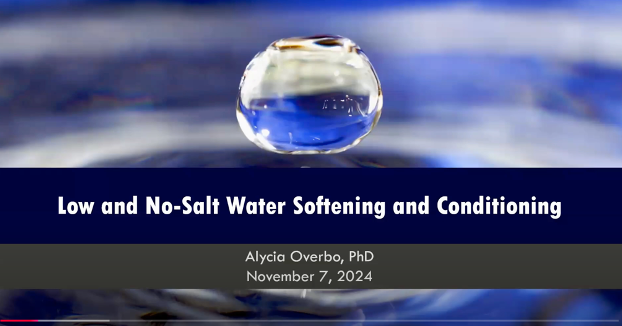
Low and No Salt Water Softening and Conditioning
This presentation will give an overview of alternatives to home water softening as well as some of the costs and benefits of these technologies. Salt pollution is an increasing concern in Minnesota, as salt use for water softening, deicing roads, and other applications can lead to increasing chloride levels in our lakes, streams, and rivers. Elevated chloride levels can be harmful to aquatic ecosystems and species like dragonflies and freshwater mussels. Research in Minnesota has identified water softening as a major source of chloride, as much of the state has very hard water and home water softening is common. There is high interest in low- and no-salt treatment alternatives to reduce chloride pollution, but there is limited research and guidance for consumers.
Read More
Practical Water Wisdom 2024 Series #9

PFAS in Water: How did they get there and why are they so challenging?
Read MorePractical Water Wisdom 2024 Series #8
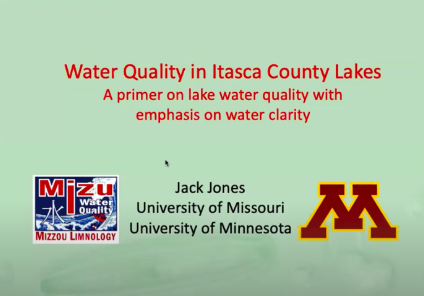
Changing Water Quality in Itasca County, Minnesota Lakes
Topic Description: Our region and state are well-known for iconic, high-quality waters. Some people have reported seeing decreases in water quality and unwelcome changes in algae and plants in lakes. This presentation explores these concerns and the data that help us understand how lakes might be changing. An exploration of the factors that might lead to changes in our lakes is also discussed.
Read MorePractical Water Wisdom 2024 Series #7
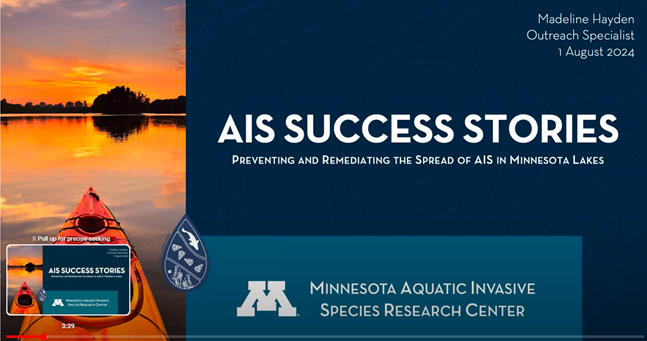
Success Stories on Preventing and Remediating the Spread of AIS in Minnesota Lakes
Speaker Madeline Hayden, Minnesota Aquatic Invasive Species Research Center (MAISRC) Research Outreach Specialist Hayden plays a crucial role in connecting research projects with stakeholders and providing vital support for outreach and research translation initiatives. With over 12 years of experience in freshwater mussels and river ecology, Hayden previously led the freshwater mussel propagation program with the Minnesota Department of Natural Resources. There, she established an aquaculture facility to rear federally endangered mussel species in Lake City, Minnesota, driven by her deep passion for preserving the health and biodiversity of Minnesota's lakes and rivers.
Read MorePractical Water Wisdom 2024 Series #6
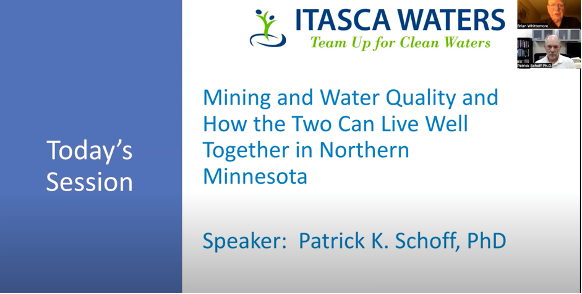
Mining & Water Quality - How the Two Can Live Well Together in Northen Minnesota
This webinar delves into the intricate relationship between mining activities and water quality management in the context of Northern Minnesota. With its rich mineral deposits and abundant freshwater resources, the region faces the dual challenge of economic development through mining while safeguarding its pristine water bodies. The webinar explores innovative approaches and best practices aimed at achieving a balance between mining operations and water quality preservation. Drawing from case studies and expert insights, the discussion navigates the complexities of regulatory frameworks, technological advancements, and community engagement strategies. By fostering dialogue and collaboration among stakeholders, the webinar advocates for a holistic approach to ensure the sustainable coexistence of mining activities and water quality protection in Northern Minnesota.
Read MorePractical Water Wisdom 2024 Series #5
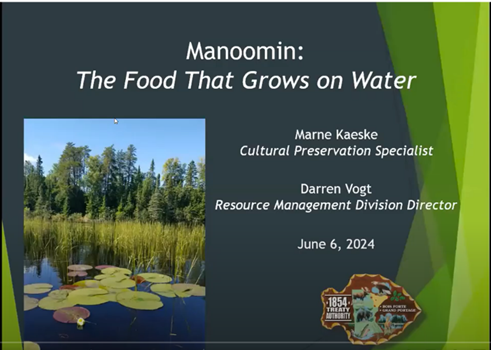
Manoomin (Wild Rice): The Food That Grows on Water
Wild rice is a valuable food source and culturally significant resource that tribal communities and many other partners work to protect. The cultural importance, biology, conservation, and harvest of wild rice will be discussed. Additional information will be shared on education and outreach efforts that further work to preserve this resource for future generations.
Read MorePractical Water Wisdom 2024 Series #4
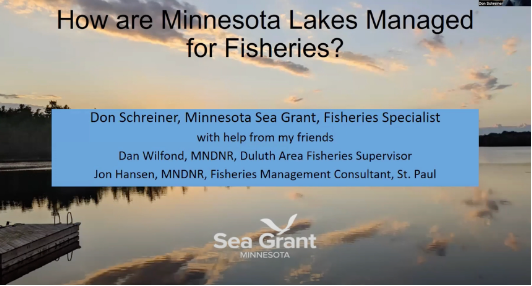
How Minnesota Determines Fish Management Strategies, Including Stocking
Almost every angler and property owner has an opinion on how the fisheries in their lake of interest should be managed. In many cases those opinions are extremely variable. Don’s presentation will describe how fish populations in Minnesota lakes are managed. The Minnesota Department of Natural Resources uses a science based approach to make management decisions based on the status of the present fish community, fish population structure and abundance, historical trends, lake habitat type and public input. Information will be provided that discusses the various aspects of fish stocking programs, why stocking may be desirable and why it may not. The need for long term management and protection of lake habitats and water quality will be discussed as it is the key to healthy fish populations.
Read MorePractical Water Wisdom 2024 Series #3
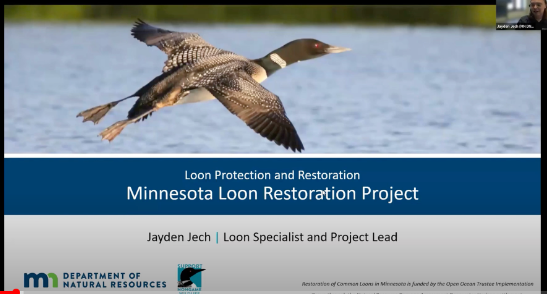
Loon Protection and Restoration in Minnesota
Learn more about the restoration and conservation of Minnesota’s state bird, the common loon. Together we will explore loon biology, threats facing loons, and ways you can support the conservation of the species. We will share information about the Minnesota Loon Restoration Project and opportunities to participate in ongoing community science efforts with the Minnesota Department of Natural Resources, Nongame Wildlife Program.
Read MorePractical Water Wisdom 2024 Series #2
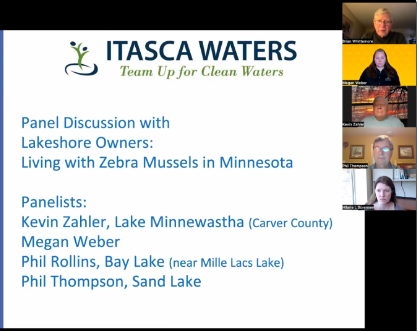
Living with Zebra Mussels in Minnesota - A Cautionary Tale
A discussion with three lakeshore owners who have been living with zebra mussels in Minnesota, along with a University of MN AIS specialist. If your lake is infected or threatened, what changes can you expect and what actions might you need to take?
Read More
Practical Water Wisdom 2024 Series #1
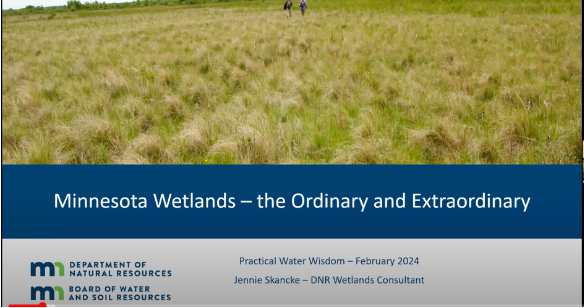
The Value of Wetlands and The Regulations that Protect Them
Presented by Jennie Skancke, Wetlands Program Consultant, Division of Ecological and Water Resources, Minnesota Department of Natural Resources. Topics discussed were what are wetlands, what is different about those in northern Minnesota, why do we want and need them, and how can we prevent damage to them with regulations.
Read MorePractical Water Wisdom 2023 Series #9
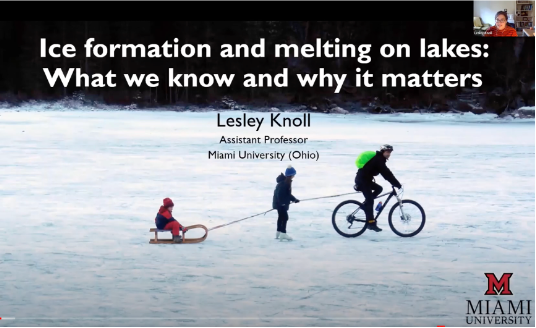
Ice formation and Melting on Lakes: What we know and why it matters.
Presented by: Dr. Lesley Knoll is an Assistant Professor at Miami University (Ohio). She is a freshwater ecologist, and her research focuses broadly on how global change affects freshwater systems. Some of her recent work focuses on warming winters and lakes showing that lakes are biologically active in the winter, that what happens in the winter can shape lake dynamics in the summer, and that lakes provide important cultural ecosystem services to people during the winter.
Read MoreSpecial Halloween Water Wisdom Program
.png)
Supernatural Lakes: Monsters, Ghosts, Witches, Fairies and Aliens
For centuries, people have looked at lakes and ponds as places of mystery, wonder and the unknown. Perhaps this is because they can't easily see beneath the surface so let their imaginations run wild - or is it? As a Hallowe'en treat, I will talk about supernatural lakes and tell stories of lake monsters, lake ghosts, lake witches, wicked water fairies and even aliens harbored beneath the seemingly serene waters of lakes around the world. Kick your Halloween off the aquatic way and learn some strange and supernatural things about the lakes we love.
Read MorePractical Water Wisdom 2023 Series #8
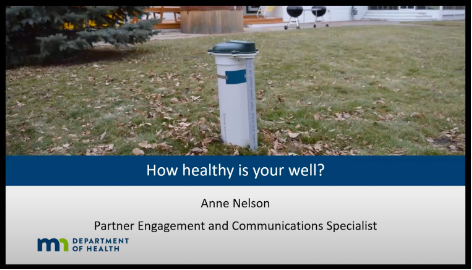
How Healthy is Your Well?
Presented by: Anne Nelson is an Extension Educator working for the University of Minnesota Extension with a focus on rural groundwater management. She works primarily with farmers and private well owners to manage and protect groundwater as a drinking water source. She works with nutrient management, irrigation management, and private well concerns.
Read More
Practical Water Wisdom 2023 Series #7
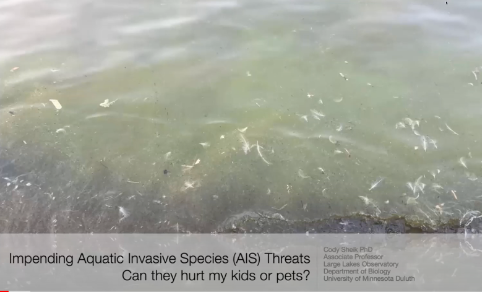
AIS threats: Can they kill your pet or hurt your kids?
Presented by: Dr. Cody Sheik is an Associate Professor at the Large Lakes Observatory, University of Minnesota Duluth, Duluth, MN. He is a microbial ecologist that focuses on the roles microorganisms, especially cyanobacteria, play in freshwater ecosystems. The Sheik Lab uses DNA-based approaches to identify microorganisms and the functional roles they mediate in the environment. His lab specializes in integrating genome-based data with environmental data to dissect nutrient cycles. His work has primarily focused on the Great Lakes but recently has extended to cyanobacterial blooms across Minnesota. Here they use the genomes of the cyanobacteria to identify cyanotoxin-producing vs non-toxin-producing species, with the ultimate goal of identifying the culprits and their growth cycles
Read More
Practical Water Wisdom 2023 Series #6
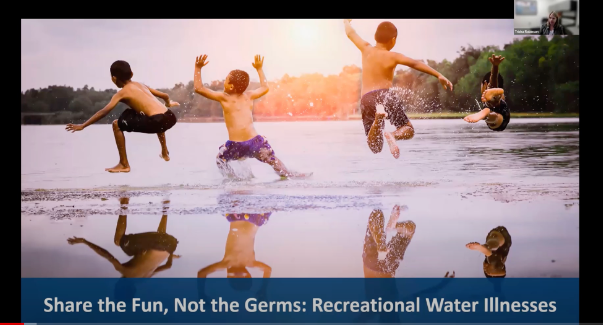
Water-borne disease/symptoms: Can Swimming Make Me Sick?
Presented by: Trisha Robinson is the Epidemiologist Supervisor of the Waterborne Diseases Unit at the Minnesota Department of Health where she oversees the routine surveillance activities, outbreak investigations, and health promotion activities for all waterborne pathogens, including Cryptosporidium, Giardia, Legionella, and free-living ameba.
Read MorePractical Water Wisdom 2023 Series #5
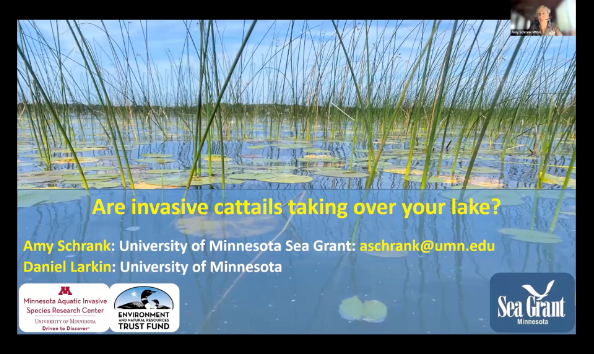
Are invasive cattails taking over your lake?
Presented by: Dr. Amy Schrank, Extension Program Leader at the University of Minnesota Sea Grant and an Adjunct Assistant Professor in the Department of Fisheries, Wildlife and Conservation Biology at the University of Minnesota. Amy is an aquatic ecologist and her current research interests include understanding the effects of invasive, hybrid cattail on fish communities and more.
Read MorePractical Water Wisdom 2023 Series #4
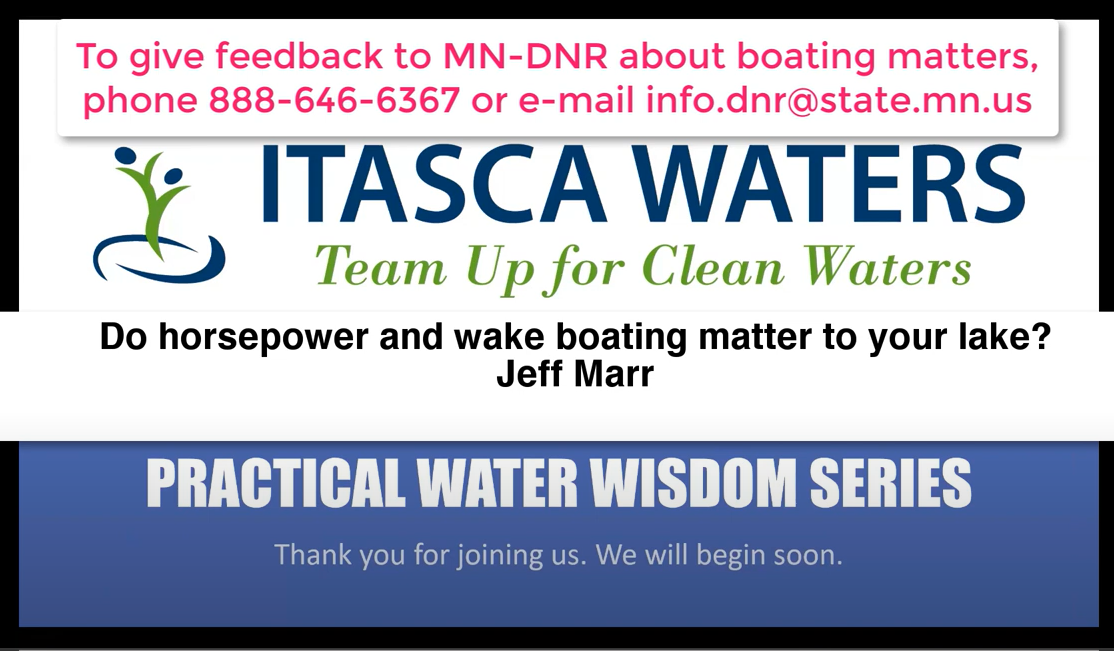
Do horsepower and wake boating matter to your lake?
Presented by: Jeff Marr is the Associate Director of Engineering and Facilities at the St. Anthony Falls Laboratory (SAFL), University of Minnesota. . In his current role, Jeff oversees the applied research team at SAFL, which has ongoing work in stormwater engineering, hydraulic modeling, wind and waterpower, river engineering and restoration, and technology development.
Read MorePractical Water Wisdom 2023 Series #3
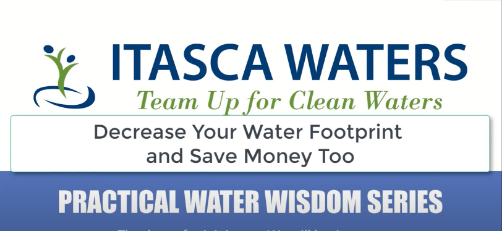
Decrease Your Water FootPrint and Save Money Too!
Presented by: Dr. Afton Clarke-Sather, is an Associate Professor of Geography at the University of Minnesota Duluth. He is a human-environment geographer who has studied water use and water policy for the last decade and a half.
Read More
Practical Water Wisdom 2023 Series #2
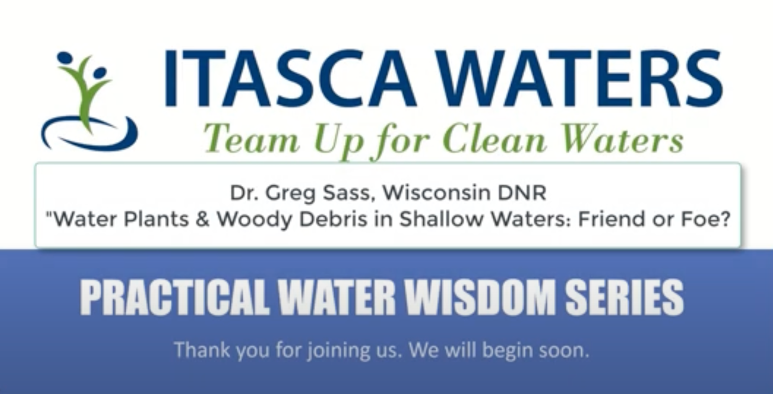
Water Plants and Woody Debris in Shallow Water: Friend or Foe?
Presented by Gregory G. Sass, PhD. Fisheries Research Team Leader, Office of Applied Science, Wisconsin Department of Natural Resources based in Boulder Junction, Wisconsin.
Read MorePractical Water Wisdom 2023 Series #1
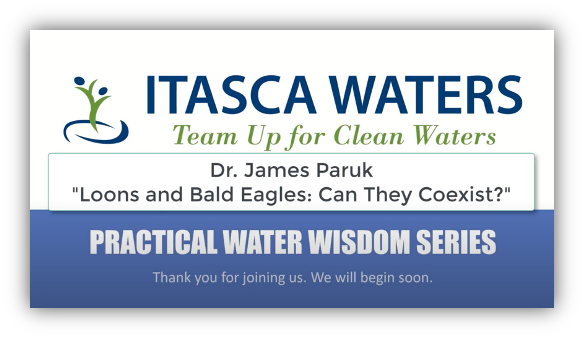
Loons and Bald Eagles: Can They Co-exist? Presented by: Dr. James Paruk, Professor of Biology, St. Joseph’s College, Standish, Maine. James is one of the world’s leading experts on the Common Loon.
Read MorePractical Water Wisdom Series #8
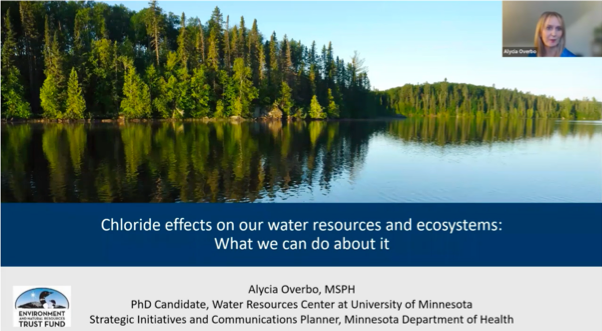
Chloride Effects on Our Water Resources and Ecosystems: What Can We Do About It
Alycia Overbo, PhD Candidate, UofM Water Resources Science, and Strategic Initiatives and Communications Planner for Minnesota Department of Health. Her research focuses on sources of chloride pollution to the environment and potential solutions for Minnesota communities. Alycia works at Minnesota Department of Health as a Strategic Initiatives and Communications Planner. In this role, she supports special monitoring projects, policy initiatives, communications, and outreach activities for the state drinking water protection program.
Read More
Practical Water Wisdom Series #7
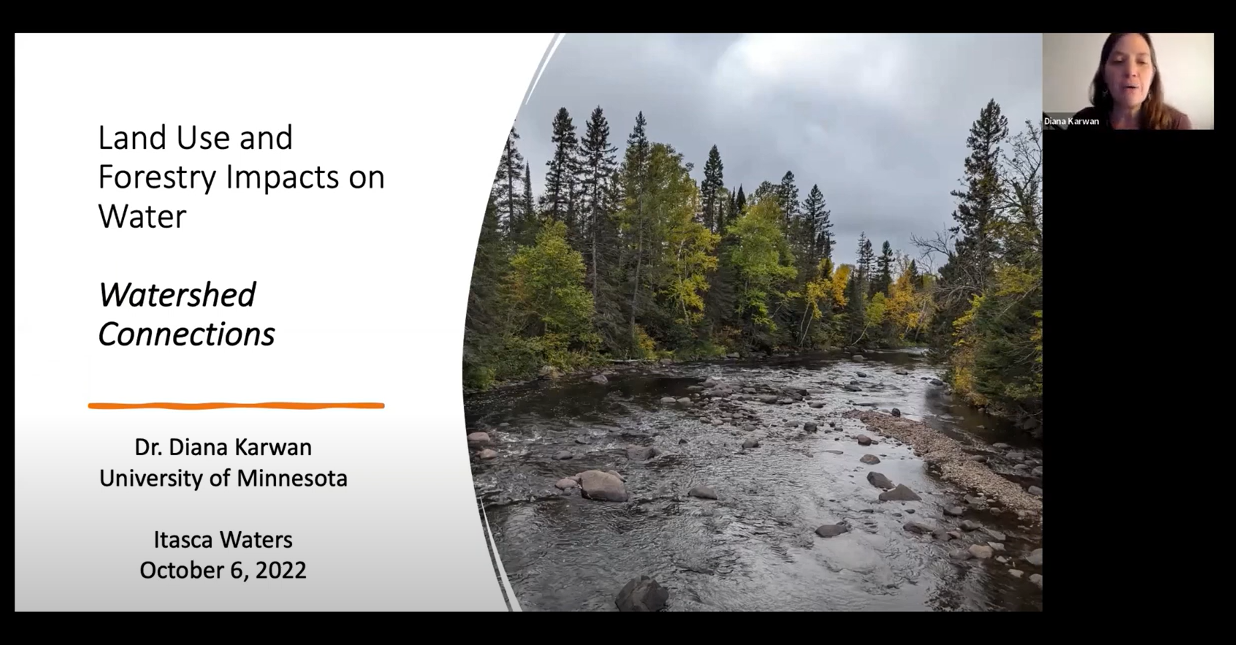
Land Use and Forestry Impacts on Water
Dr. Karwan is Associate Professor, Uof M Dept. of Forest Resources and an Adjunct Assistant Professor in the Department of Soil, Water, and Climate and an Associate in the Institute on the Environment. She received her Ph.D. from Yale University, School of Forestry and Environmental Studies.
Read MorePractical Water Wisdom Series #6
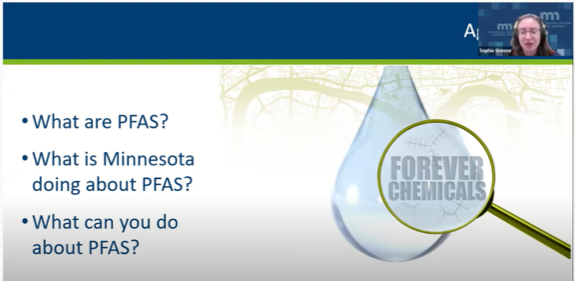
PFAS in Minnesota: Understanding the Impacts of Forever Chemicals
Sophie Greene is the PFAS Coordinator at the Minnesota Pollution Control Agency. She began this role in 2020 and has previously worked on human health risk assessment at the Environmental Protection Agency in Washington DC.
She will share an update on what we know and don’t know about PFAS and its impacts on our state. PFAS (or per- and poly-fluoroalkyl substances) are a group of nearly indestructible chemicals that linger indefinitely once they make their way into the environment.
Read MorePractical Water Wisdom Series #5
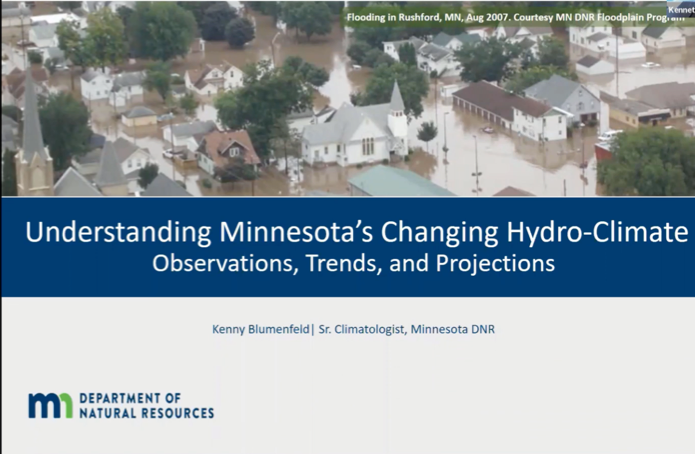
Dr. Blumenfeld presents a program about how Minnesota’s climate is experiencing changes unlike anything we have observed previously.
Read MorePractical Water Wisdom Series #4
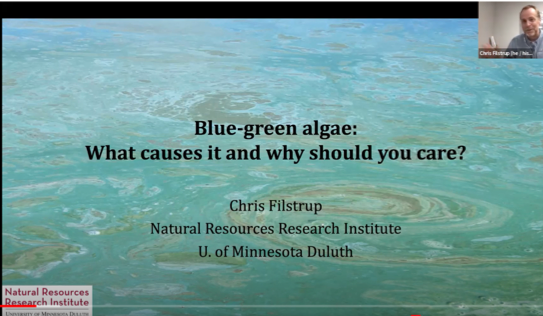
Presented by: Dr. Chris Filstrup, Applied Limnologist, Natural Resources and Research Institute, Duluth, Minnesota.
Blue-green algae, also known as cyanobacteria, present a unique water quality challenge because they can rapidly form dense surface scums, or blooms, and produce potent toxins that can make people sick and kill pets and wildlife.
Read MorePractical Water Wisdom Series #3
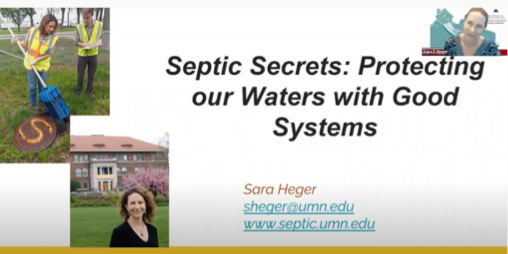
Dr. Sara Heger provides property owners information about how septic systems work, including how to care for and maintain a septic system so it can function properly. Septic systems are designed to last 20-30 years, but can last more or less depending on use, care, and maintenance.
Read MorePractical Water Wisdom Series #2
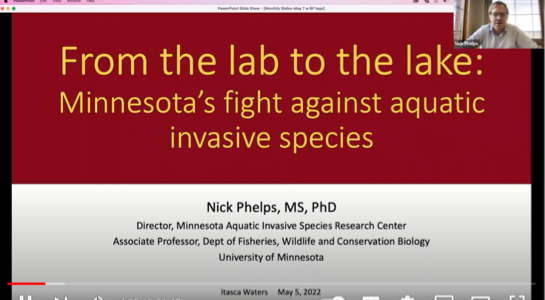
Dr. Phelps, Director of the MN Aquatic Invasive Species Center, presents an interactive webinar “From the Lab to the Lake: Minnesota’s Fight Against Aquatic Invasive Species”.
Read MorePractical Water Wisdom Series #1
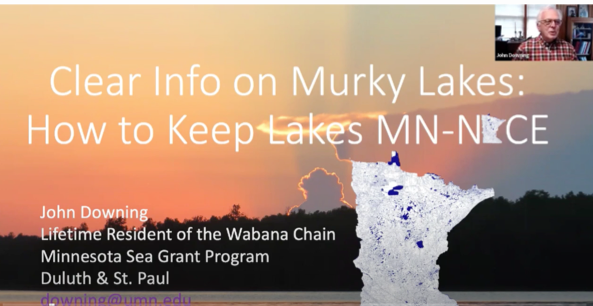
Presented by Dr John Downing Director of Sea Grant College program. "Clear Information on Murky Lakes: How to Keep Them Minnesota Nice."
Read MoreSeptic Systems with Mike Casey

This episode features host Jesse Davis as he interviews Bunes Septic Service Co-Owner Mike Casey on the topic of Septic Systems. Learn about proper maintenance, how septic systems affect the surrounding habitat, and what the public can do to protect and preserve Minnesota's pristine lakes.
Read MoreShoreland Advisors Program with Karen Terry
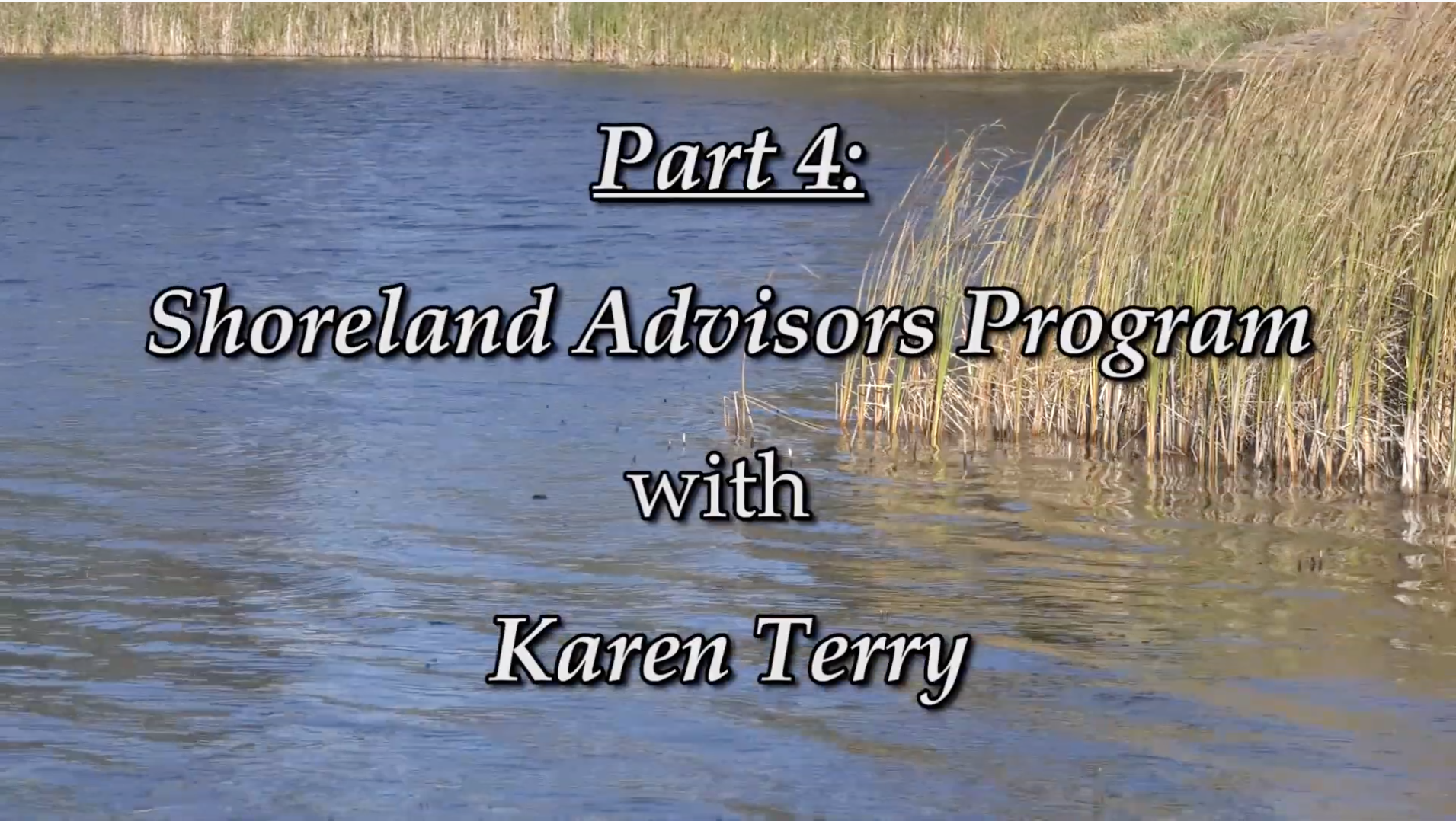
This episode features University of Minnesota-Morris Educator Karen Terry on the topic of the Shoreland Advisors Program and how to you can learn about properly maintaining and the habitat surrounding your shoreline.
Read MoreShoreline Management

This episode features Minnesota DNR Shoreline Habitat Specialist Heather Baird on the topic of shoreland management and how to maintain the habitat surrounding your shoreline.
Read More



